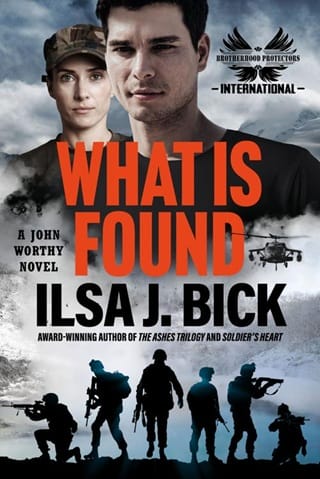Chapter 3
CHAPTER 3
Outside.
The storm was over, although the wind remained, whistling through the spaces between the cargo containers and whipping fresh snow into tiny whorls that danced and skipped over hummocks of fresh fall before stronger gusts blasted them apart. The air was frigid, razor-edged, and slashed the exposed flesh of his face. When the wind changed, he squinted against fine, gritty ice crystals which pecked and needled his eyes.
The snow was deep and reached halfway up his calves until his crampons bit into an icy glaze along the walk. He took the switchback down the mountain with exaggerated care, grateful for the guide rope anchored to the slope. Getting Davila to the van would be tough, though not impossible, if they went slowly.
One disaster at a time .
Once he put the mountain between him and the wind, the cold wasn’t as intense, and he could actually think. Chuffed his way downhill, his breath smoking, he went over next steps.
Job one was to dig out the van, maybe shovel a path on the road through the snow, enough so he could safely turn the van around and get a running start. Should check the clearance between the roadbed and the underside of the van. The last thing they needed was for him to get them stuck in the middle of nowhere. Idly, he wondered if there were such things as snowblowers in this part of Tajikistan. He should check the cargo containers again. If he found one, he’d be able to clear a large swath of the road in no time. The blower would be noisy as hell, but he bet that by the time anyone struggled up here to investigate, they’d be long gone.
Job two: lay down distance. He glanced at his watch. Noon was two hours away. Maybe four hours of daylight after that. We could get pretty far.
Job three: hope they didn’t run into anyone. Maybe the best course of action was simply to stop at Khorog. That had been a major-ish sort of town in these parts. Seriously, the place had a MAC Doland’s. If that wasn’t civilization, he didn’t know what was. But he did know they’d get Wi-Fi and cell service, which they could use now that they had their cells back
Dead ahead, about forty yards away, he spotted the van, slotted nose-in and at an odd angle, so the entire passenger side was covered as if a large white wave had rolled in and spread itself over the van.
Just like the old days Ken used to go on about. That man had an infinite supply of stories: jumping off the shed roof into a snowbank, ice-fishing at night while the Big Lake cracked and moaned, skiing from one ice cave to the next when Lake Superior froze enough for the ice ferry to go back and forth from Bayfield to Madeline Island. Finding a den of foxes under his porch when he was a kid and watching as the pups, unsure what to do with a dead rabbit their mother had brought, played with it instead, tossing it up into the air the way little kids play with bouncy balls.
Ken had been a good man. Gentle. Steady. He’d met Ken when Stan had moved him from Kansas to Wisconsin. As a kid, he hadn’t known what to call this new stranger in a succession of new adults. My God, he hadn’t wanted to let go of Stan, his one anchor, that day; he remembered the feel of Stan’s arms hugging him close. Don’t you worry, Stan had said into his ear. Ken is a decent guy. He’ll take care of you as if you really are kin—and that’s what you are now, understand? I will be back to check on you, same as always, but you will be fine. Just don’t forget who you’re supposed to be this time, all right?
Long after Stan had gone, Ken made grilled cheese for supper. John remembered biting into his sandwich, still almost too hot but so buttery and velvety in his mouth he hadn’t cared. He remembered chewing and swallowing and taking a sip of pop—that’s Ken called it, not soda—then asking, What do I call you, sir?
Ken had taken a bite, chewed, cocked his head, swallowed. Why, son, you just call me whatever you want. Then, after a pause: Just don’t call me Barbie.
After that, things were better, easier, maybe because Ken reminded him a lot of Uncle Dare. Ken had a slow, easy way. Never let a word slip that didn’t need speaking, same as Dare.
At the thought of both men, a sliver of pain pierced his chest. Bittersweet memories did that to a person. He missed them both terribly, even more than his mother and father. He sometimes worried that made him a bad person, but this wasn’t something a man like him could talk about to anyone.
Because, honestly, how could he? If he did, he’d have to resurrect a boy who didn’t exist from a past long dead.
 Fullepub
Fullepub 



